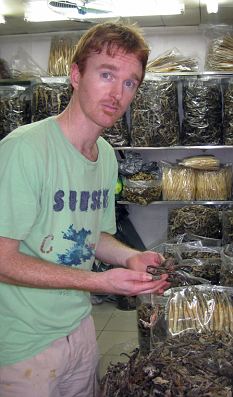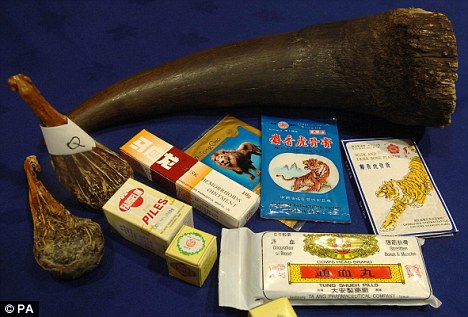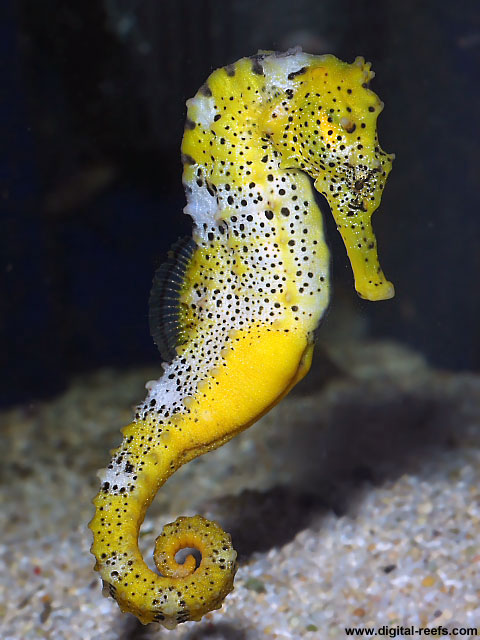PILED up from the floor to ceiling, this is just one outpost of a vast multi-million-pound trade in seahorses.
Conservationists say the intriguing creatures could be wiped out within ten years.
A new documentary shows stocks are being savaged by the Chinese medicine industry which reveres them as a catch-all cure for everything from impotence to kidney problems and baldness
Their numbers are thought to have declined by 80 percent since the 1990s.
Undercover filming found at least 150 million of the fragile creatures are now killed to make its products every year in China – seven times the official figure.
Campaigners say demand there is soaring every year, and claim some seahorse products have been found in the expanding network of medicine shops abroad, even in Britain where they it is illegal to sell them.
Marine biologist Kealan Doyle posed as a potential supplier to gain access to wholesalers, clinics and health stores in southern China.
He found one market in the city of Guangzhou sells 20million seahorses a year alone.
CITES – the Convention on International Trade in Endangered Species – say that is the size of the whole trade worldwide.
Mr. Doyle said: ‘It’s a huge underestimate. I visited stores that had something like 30,000 dried seahorses in bags piled from floor to ceiling and there are 6,000 such stores in Hong Kong alone.
‘We are not talking about a slow decline here, this is an absolute decimation of this unique creature which has been with us for millions of years. At this rate, it will be wiped out in between 10 and 20 years.’
Seahorses have long fascinated humans. A fish with a horse’s head, a monkey’s tail and the colour-changing abilities of a lizard, they mate for life, and perform a mating dance together every single morning, at the end of which the female places her eggs in the male’s abdominal pouch.
The male which then becomes pregnant and gives birth, the only creature in the world to do so, having up to 4,000 young in one go, although only a handful will survive into adulthood.

Kealan Doyle with piles of dead seahorses used for medicine in China
In the piles of dried bodies at the market, many of them were stained red, the sign of a pregnant male ready to give birth to thousands of offspring.
Around 70 countries are now catching and selling seahorses to the Chinese medicine market, where they have been used in healing for thousands of years, but demand has rocketed in the past five years.
Mr Doyle said: ‘Many, many more people can now afford seahorses who couldn’t before, and what’s really worrying is that they are now commonly being ground up and made into pills.

‘That means the little, young seahorses which would previously have been left behind are being caught as well, and that’s the next generation gone, which is a conservation disaster.’

He found parents giving seahorse pills to their children in the mistaken belief they spur growth, and says they are increasingly taken by middle-class Chinese women as a Botox substitute – due to the animals’ high levels of collagen.
Many seahorses are supplied by subsistence fisherman from poor Asian countries who receive just a few pence for a sack, while the middlemen who export them get rich.
It is easy pickings as seahorses are the ocean’s worst swimmers. Males barely move more than a square metre their entire lives, and rely on the females, which swim much further, to seek them out.
While Chinese medicine has attracted fury in the past for its use of rhino horns, tiger bones and bear bile. in the case of seahorses, Mr Doyle believes there is a way to stem the decline – by farming them.
Attempted for decades without success, he has spent 15 years perfecting the technique in his native Ireland and is one of the world’s sole breeders, with pilot projects underway in Cambodia and Vietnam.
He said: ‘We desperately need to reduce demand by raising awareness in China, but farming them, like salmon, will reduce the pressure on them, and people can make a living out of it.’
‘China has spent hundreds of millions of pounds on it and failed, because seahorses are very, very different to any other creature. The wrong nutrition or using poor quality water can make it all go wrong.’
Neil Garrick-Maidment of the Seahorse Trust, based in Devon said the situation is ‘increasingly desperate’ even on the UK’s shores where seahorses have been protected by law since 2008.

He said: ‘There is a real risk that as many countries run out there will be unscrupulous people targeting the seahorses in Britain. We do see seahorse products illegally on sale here.’
He is working with Sea Life, the aquarium chain to raise money for survey work, which will help conservation.
Shen Huijun, president of the Association of Traditional Chinese Medicine in the UK said: ‘It is illegal to use seahorses in the UK, and they are on the list of banned products which we give to our members.
‘They are rarely used in medicine in China, they are used more for sexual dysfunction and reproductive problems.’
The Seahorse Man will be screened on the Eden Channel on August 24.